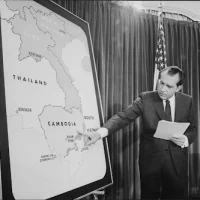With a simple “good luck” from President Richard Nixon, Ambassador Joseph Farland set out to Pakistan, unsure of what to expect. Having previously worked with the Federal Bureau of Investigation (FBI) during World War II, Ambassador Farland was always cautious of those around him. Thus, when he entered this post, he had been preparing for… Read More "The Last Ones Left: Inside the Indo-Pakistani War of 1971"
The Rough Road to Moscow for Malcolm Toon
Malcolm Toon was a fluent Russian speaker and one of the State Department’s top experts on the Soviet Union during the Cold War. He was ambassador to Czechoslovakia, Yugoslavia, Israel, and the Soviet Union. Toon was characterized in The New York Times in 1978 as “one of the most influential of the postwar ambassadors in… Read More "The Rough Road to Moscow for Malcolm Toon "
When President Richard Nixon took office in 1969, he and National Security Adviser Henry Kissinger vowed to find a way to end U.S. involvement in Viet Nam quickly and honorably without appearing to cave in to communist pressure. The U.S. launched a secret air campaign, thirteen major military operations, against North Vietnamese bases in Cambodia.… Read More "The U.S. Incursion into Cambodia"
Bombing North Vietnam into Accepting Our Concessions: Christmas Bombings, 1972
President Richard Nixon ordered plans for retaliatory bombings of North Vietnam after talks to end the war in Vietnam broke down December 13, 1972. Operation Linebacker II, otherwise known as the “Christmas Bombings,” began December 18 and lasted for two weeks. A total of 741 B-52 sorties were dispatched, dropping 20,000 tons of bombs on… Read More "Bombing North Vietnam into Accepting Our Concessions: Christmas Bombings, 1972"
Bad Blood: The Sino-Soviet Split and the U.S. Normalization with China
In the 1960s, in the depths of the Cold War, the world was viewed in terms of a zero-sum game: wherever the USSR won, the U.S. by definition lost. The People’s Republic of China (PRC), despite its massive size, was considered to be the Soviets’ little brother and thus not a real player. The State… Read More "Bad Blood: The Sino-Soviet Split and the U.S. Normalization with China"
Ping Pong Diplomacy, April 1971 — Opening the Road to China
Following the Chinese Civil War and the establishment of the People’s Republic of China on the mainland, a “Bamboo Curtain,” the Chinese equivalent of Russia’s “Iron Curtain,” was established, closing off China from the non-Communist world. The 1966 Cultural Revolution only served to strengthen the Communist Party’s commitment to isolation from the West. However, by… Read More "Ping Pong Diplomacy, April 1971 — Opening the Road to China"
Tracking China’s Political Change through Dazibao Posters
Chinese “big-character posters,” or dazibao, are handwritten posters mounted on walls and published in papers or pamphlets to communicate protest or launch ideas into public discourse. During the era of Mao Zedong, throughout the Great Leap Forward and the beginning of the Cultural Revolution, dazibao were part of mass campaigns directed by the Communist Party.… Read More "Tracking China’s Political Change through Dazibao Posters"
A Peace That Couldn’t Last – Negotiating the Paris Accords on Vietnam
Signed on January 27, 1973, the Paris Peace Accords were intended to finally end the Vietnam War, which had cost the lives of thousands of American soldiers, not to mention the millions of Vietnamese civilians who were killed, injured, or displaced. Initially, the Accords were negotiated in secret by National Security Advisor Henry Kissinger and… Read More "A Peace That Couldn’t Last – Negotiating the Paris Accords on Vietnam"
Pierre Trudeau: One Long Curve, Full of Turning Points
With the October 2015 election of Justin Trudeau as Prime Minister of Canada, we take a look back at his father, Pierre Elliot Trudeau, one of the most influential and memorable Prime Ministers in Canada’s history. He served as Prime Minister from 1968 to 1979 and then again from 1980 to 1984. Throughout his time in power… Read More "Pierre Trudeau: One Long Curve, Full of Turning Points"
The Resignation of Richard M. Nixon
Richard M. Nixon’s presidency was a tempestuous mix of stunning foreign policy achievements (his trip to China) and shameful lapses in morality and judgment (the Watergate scandal). After the host of criminal activities (bugging the offices of political opponents, harassing activist groups, and breaking into the Democratic Party headquarters) came to light, Nixon faced impeachment.… Read More "The Resignation of Richard M. Nixon"

